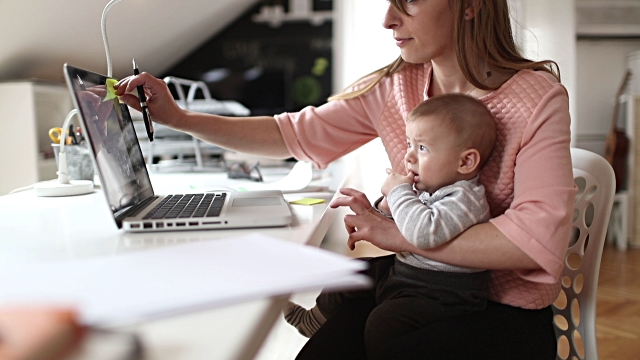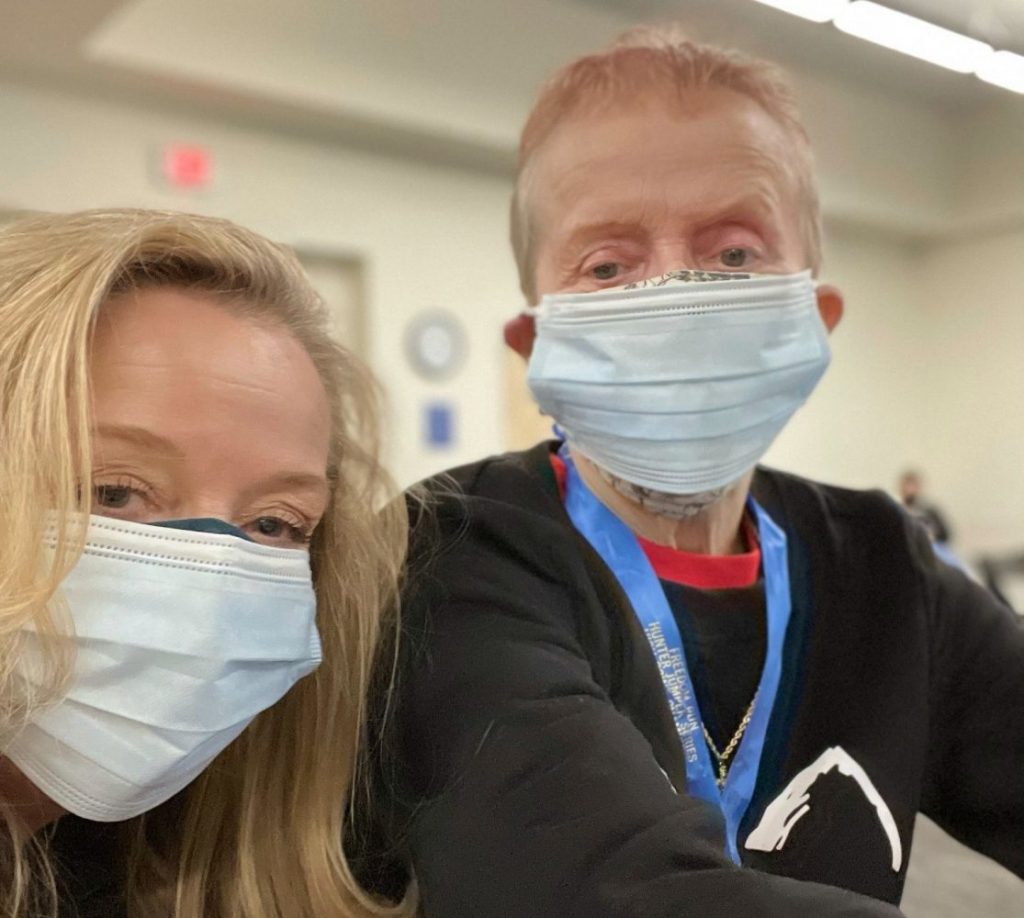
Debbie Page runs a small business coaching firm from the Bellevue, Washington, home she shares with her 76-year-old mother, who has advanced dementia.
When lockdown orders were handed down last March, at the start of the coronavirus crisis, her mother’s access to adult daycare programs was immediately ripped away. With Covid-19 spreading fast, Page initially declined to bring outside caregivers into her home.
And then, one summer afternoon, the incident happened.
While Page was upstairs conducting a meeting, her mother — who had been given free rein of the home’s carefully designed ground floor — made her way into their garden, where she tripped and fell to the bottom of a hill.
“She was down there for an hour by the time I had finished my client meeting,” says Page, who still recalls the panic that gripped her that day, even though her mother has since recovered. It was her breaking point. “When we talk about the moment something becomes impossible, people always say, ‘How far will you go?’ I don’t think you know until you get there.”
Page’s story is gut-wrenching. It’s also familiar.
After all, it’s one we’re told every few months. You’ve seen the articles and heard the podcasts — they appear in publications like The New York Times and NPR, and each one details the ways in which working, caregiving women are overwhelmed by the stress of trying to do it all while a global pandemic continues to stall life as we once knew it. On every form of social media, women share these posts, agreeing with them and adding their own, similar anecdotes.
Time passes. Another post goes live, then goes viral. On occasion, a political promise is made.
And nothing changes.
Throughout the discourse, the phrase “mom guilt” is used to describe the untenable mix of mounting responsibilities and residual shame at not being able to consistently meet them all. “Caregiver guilt” would be more appropriate — though either way, it’s a feeling overwhelmingly experienced by women.
[Related: She Launched a Platform to Help Overwhelmed New Moms in Normal Circumstances. Then Came the Pandemic]
Even before the pandemic, women were running the caregiving show. Studies suggest that 65 percent of women serve as caregivers in their families, and spend 50 percent more time filling those roles than men do. Just over half of women handle the lion’s share of parenting duties in homes with both a mother and father present. Research additionally shows that the majority of household chores — in particular, laundry, cooking and other cleaning duties — also wound up on women’s to-do lists. (And as this viral web comic illustrates, composing the to-do lists falls to women, too, more often than not.)
The spread of Covid-19 has only exacerbated these inequities, as well as the need for affordable caregiving and childcare options for families. The result? A mass exodus of over 865,000 women from the workforce, as many assume those roles themselves. As is the case with most of what ails our nation, women of color have been especially impacted throughout.
Rebecca Churchill doesn’t need studies to tell her what’s going on. She’s the founder of Churchill Communications & Marketing in Oakton, Virginia. On top of keeping her firm afloat as Covid-19 keeps us housebound, she is also doing her best to support her daughter, who grapples with depression — at one point, she says, it progressed to suicidal thoughts, and her child had to be hospitalized. Churchill also cares for her mother, who has Parkinson’s disease, and two other children. On top of that, she also has “a significant other who doesn’t get enough of my attention.”
She admits to being frequently overwhelmed. “The day is never over. The house is always dirty. I wake up at night and I remember things that I have to do,” Churchill says. “I worry about my clients and our deliverables. I need more help in my agency but I can’t pay for it.”
Churchill adds, “I am literally grinding my lower teeth to the point where I need to find an orthodontist.”
[Related: 5 Pandemic Pivots That Show the Resilience of Women Entrepreneurs]
Tales from the Trenches
Government agencies like the Centers for Disease Control and Prevention are aware of the issue. The CDC has dedicated a page to detailing the physical and mental tolls the added responsibilities are taking on women, and suggesting ways to stave off the negative effects. But women’s present realities require more than one page to comprehend, to say the least.
The Story Exchange recently conducted an informal poll of women entrepreneurs who are also parents and caregivers for an anecdotal look at how this specific group of women professionals is faring in these difficult times. Dozens replied, and their stories were as harrowing as they were predictable.
The women business owners who reached out reported taking on the majority of caregiving work — unpaid work, it’s worth noting, amounting to roughly $470 billion nationwide in a year. That’s overwhelming on its own. Then add in the reality of living through a global pandemic, the likes of which hasn’t been seen in just over a century.

Respondents to our callout reported making numerous sacrifices to make their respective quarantine situations work — for example, squeezing additional working hours into what would normally be times of relaxation, such as first thing in the morning or after the children have gone to bed.
But these amount to Band-Aids applied to deep cuts. Work calls and Zoom meetings are still frequently interrupted by the needs of others in the home. Children continue to struggle with remote learning, or face exposure to Covid-19 in school districts that have adopted hybrid learning programs. Emails get answered when ailing or elderly parents are napping. Meal- and meeting-planning tabs sit side by side in browser windows throughout the country — both are ignored for hours at a time.
In each of these homes, everyone of every age is feeling increased degrees of depression and anxiety — and not all of them are able to articulate what they’re feeling.
On a national level, this perfect storm is resulting in a widespread mental health crisis for women. The business owners who reached out to us talked openly about the negative impacts this impossible juggling act is having on their well-being — not to mention the well-being of their businesses, as growth trajectories are adjusted and expansion plans are put on hold indefinitely. And while some spoke gratefully of the help they receive from partners, nearby parents or hired part-time help, many others are on their own, whether partnered or not. (One respondent referred to herself as “a single mother in a marriage” — a turn of phrase that has been on our minds from the moment we read that particular reply.)
[Related: 1 Year Later, Concerns About Employees’ Mental Health Are on the Rise]
Stephanie Korczynski, the founder of Charlotte, North Carolina, coaching business The KORE Company, is one of those stressed caregivers (though she reports having a supportive partner). She launched her firm during the pandemic, and rather than having opportunities to decompress between tending to her budding business and tending to her family, she would find herself shifting instantly from one “mode” to another. Her distracted mindset often negatively impacted quality time with her daughter.
“Everybody goes through ‘parent guilt’ — there’s no way around it, in my opinion,” Korczynski says. “You’re always going to feel like you are lacking in some area as a parent.” But for her, this manifested into frequent moments of self-doubt. “I started asking my husband stupid questions. ‘Do you think I’m a good mom?’ What did I expect him to say? Of course he [thinks I am]. And I thought so, too. But I needed that constant reinforcement,” Korczynski says.
Meanwhile, stressed-out caregivers who take a moment to check Instagram or Facebook are bombarded with unrealistic standards. “Social media is flooded with glossy images of everyone appearing to be sailing through this pandemic and all of its stressors with ease,” says Jill Canes, founder of Face Forward Medical Aesthetics in Lexington, Massachusetts — who adds that reality for her is anything but glossy. “The emotional roller coaster of entrepreneurship is hard enough. Add to this the demands of helping preschool and elementary school children navigate remote learning and Zoom meetings, all the while trying to stay healthy myself and maintain a healthy marriage…”
She adds, “Of course negative feelings start to creep in. Feelings of dread, feelings of panic.”
Knowing You’re Not Alone
Few government solutions to this unsustainable yet very common problem exist at present.
Before this year, the most significant attempt to address the situation on a federal level came in the form of the Recognize, Assist, Include, Support and Engage (RAISE) Family Caregivers Act signed into law in January 2018. Last November, the council tasked with crafting a caregiver support strategy released a series of recommendations, including awareness and outreach efforts, instituting caregiver training programs and developing flexible workplace policies.
Meanwhile, on state and local levels, protections exist that keep employees’ jobs safe while they tend to their families. But parents and caregivers need more — they need tangible, direct help and support. Women business owners are especially vulnerable, as they are grappling with all of this while keeping their companies afloat in a pandemic economy where roughly 800 small firms are closing each day. And unlike Covid-19, there’s no vaccine for this problem.
In January, a group of 50 women — spearheaded by Girls Who Code founder Reshma Saujani, and involving celebrities and activists like Eva Longoria, Gabrielle Union, Charlize Theron, Tarana Burke and Amy Schumer — called on the administration of President Joe Biden to implement a Marshall Plan for Moms. In a resolution introduced to the U.S. House of Representatives last month, backers note that a clear, decisive plan is needed “to revitalize and restore mothers in the workforce” since “mothers, especially mothers of color, have been pushed to the brink of economic, social, and emotional collapse during the COVID-19 … pandemic because of the existing economic and social inequalities women have long faced.”
Specifically, the resolution proposes that any Covid-19 relief or recovery packages include policies such as a robust paid leave policy, establishment of an unemployment insurance program and raising the federal minimum wage to at least $15 an hour, among other suggestions. In an open letter, 50 prominent men — from actor Don Cheadle to basketball player Steph Curry — voiced their support for the plan.

The $64,000 question: Until such help and support arrives, how do these women cope?
By being honest about how hard it is, for starters, says Stephanie Solheim. She’s the CEO of Toledo Web Designers & Digital Marketing in Toledo, Ohio. She’s also a mother of two (and a proud “mom” to three dogs). “There wasn’t a particular moment where work and life became impossible to balance — it actually happens quite regularly,” she says of her hectic life. “I describe this feeling like trying to set up a picnic in a strong windstorm. It is frustratingly impossible to make any progress and you wonder if you should even be there at all.”
[Related: 5 Ways to Run a Startup While Avoiding Burnout]
She continues, “There is so much guilt and shame that surrounds us when we openly admit that we can’t keep up with the work, or we aren’t being the kind of friend we want to be. I am all for being open about it, and expressing how normal it is.”
Routines have offered comfort to others. Korczynski swears by her end-of-day “shut-down ritual,” which involves returning her email inbox to zero — getting it there in the first place was a day-long activity, she admits — cycling through her business’ social media accounts and sending out confirmations for the next day’s meetings. She also is waking up earlier every morning to snag some extra “me” time. These adjustments have allowed her to be more present for her daughter, she says.
For some, it was a matter of making an unapologetic choice to let one element of their life always come before the other. “While I run my own business, and it usually feels like one of my children, nothing is more important than my family. When those negative feelings creep in, I find myself needing to unplug, and focus on family time,” says Elisa Pupko, Owner of Treasure Trunk Theatre in Brooklyn, New York. “I’ll take my daughter for a walk. I’ll get down on the floor and do a puzzle with her, or we’ll sit and have a tea party. Anything that re-focuses all my attention on her and allows the external noise to be blocked for a few moments.”
So the struggles are different, yet the same. The solutions also vary greatly, yet share the core principles of simplifying and stepping back. But one thing that was truly universal in the responses we received was agreement on the importance of plainly naming these difficulties in the first place.
“None of us are doing this alone. None of us have this figured out,” says business coach Page — and speaking plainly about that is important. After that breaking point with her mom’s fall, Page decided to recruit outside help, though she knew doing so would increase their Covid-19 risk. And while she cherishes the time she has with her mother, she still feels the stress of juggling her care along with her clients’ needs.
It helps her to know she’s not alone. “As women, the pressures of caregiving fall to us the vast majority of the time. We are asked … to do a lot,” she notes. “The more we share our stories and experiences, the more we will find strength in other people.”
[Related: Yes, the Pandemic Has Been Devastating on Working Women. But There’s Hope]

